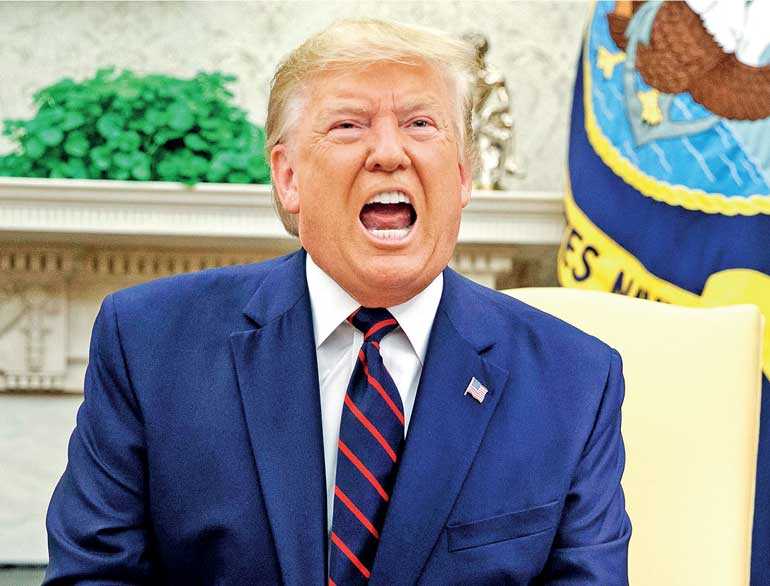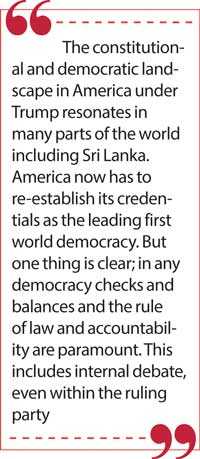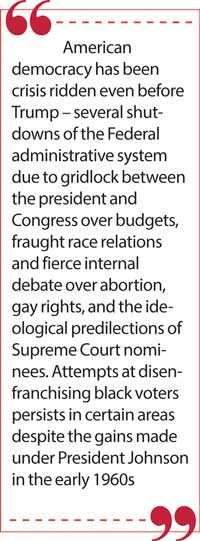Friday Feb 20, 2026
Friday Feb 20, 2026
Wednesday, 13 January 2021 00:00 - - {{hitsCtrl.values.hits}}

The Trump presidency and the actions of his supporters have exposed the internal stresses of democracy even in the most powerful democratic country in the first world
President Donald Trump will be leaving office as a one term president on 20 January unless he resigns or is impeached for a second time or removed by the 25th Amendment prior to that.
His latest gambit was to incite his supporters to prevent the certification of the victory of President Elect Biden by storming Congress last week. The images that flashed across the world of this frenzied mob attack stunned allies and was greeted with amusement by foes.
Resultantly the Democrats who now control the House, Senate and the presidency are expected to impeach him for “incitement to insurrection”. Despicable attacks on democratic legislatures have historical antecedents – the Reichstag fire, the bomb flung at the parliamentary group meeting presided by President Jayewardene in 1987 and the 2017 attack on the UK Parliament.
This comes in the aftermath of Trump’s refusal to accept the results of the election after his loss to Biden by a majority of over seven million votes, perhaps the largest in US political history with unsubstantiated allegations that the election was “stolen” from him – somewhat reminiscent on a far lesser and certainly more peaceful scale to Gen. Fonseka’s claim that he lost to Mahinda Rajapaksa in 2010 due to a “computer jillmart”. Several ensuing law suits initiated by Trump failed. His lawyer Guilliani, a once respected Mayor of New York, has reduced himself to a jester.
The overrunning of Congress by his supporters was to prevent the final certification of the Biden victory ordained by the American Constitution. That constitution is unique in the world – the first written constitution, sovereignty vested in the people, an elected executive president, a Bill of rights and a separation of powers with checks and balances between the branches of government.
Its influence on other constitutions is immense including the Sri Lankan second Republican Constitution of 1978. The American commitment to constitutionalism also formed the bedrock of its foreign policy where the virtues of democracy and the rule of law was projected as the triumph of a liberal democracy signifying the “end of history” as there was no superior system known to man. Other nations are judged by the standards of the American system.
But the Trump presidency and the actions of his supporters have exposed the internal stresses of democracy even in the most powerful democratic country in the first world.
Trump’s refusal to accept what the Wall Street Journal editorialised as “the basic bargain of democracy which is to accept the result win or lose” has significant repercussions for democracy worldwide. His  initial refusal to allow the incoming administration access to briefings and not yet conceding the election are some manifestations. But there was no excuse for senior Republican Senators McConnell and Graham delaying their acceptance of President elect Biden’s victory once the legal challenges became manifestly ludicrous.
initial refusal to allow the incoming administration access to briefings and not yet conceding the election are some manifestations. But there was no excuse for senior Republican Senators McConnell and Graham delaying their acceptance of President elect Biden’s victory once the legal challenges became manifestly ludicrous.
Part of the problem engendered by Trump is the process of electing a President in the US. It is perhaps the only country in the world where the winner can lose the popular vote but still claim the presidency due to the system of the electoral college which allocates to each State based on its legislature a number of electors a plurality of which determines the outcome. Thus despite losing the popular vote Bush beat Gore in 2000, and Trump beat Hillary Clinton in 2016.
Given America’s Federal nature, each State controls the election process overseen by officials who have overt political affiliations to either of the main parties. Candidates are permitted observers at the counting centres and this has generally worked smoothly. Congress ultimately certifies the results of each State or electoral college – but the antitheses of democracy still persists in that the winner can be declared although he has lost the popular vote.
Fortunately for Sri Lanka we have a constitutionally prescribed threshold of the popular vote for a candidate to win, and an election overseen by an election commission. India too has a National Elections Commission which oversees its elections despite being a semi Federal State.
American democracy has been crisis ridden even before Trump – several shutdowns of the Federal administrative system due to gridlock between the president and Congress over budgets, fraught race relations and fierce internal debate over abortion, gay rights, and the ideological predilections of Supreme Court nominees. Attempts at disenfranchising black voters persists in certain areas despite the gains made under President Johnson in the early 1960s.
But arguably Trump exacerbated divisions in America. He took control of the Republican party and infused it with a toxic mix of a one man show and palpable dissembling with no dissenting voices, except Mitt Romney latterly. That he was perhaps the most inarticulate president in recent times beggars belief on his hypnotic ability in this regard.
As President with majority support in the Senate (until Georgia) he escaped conviction despite prior impeachment by the lower House for offences which were egregious. He used foreign policy which is a presidential preserve as an extension of his personal political interest. Partisanship and rancour has increased between the two parties in Congress. One recalls Senator McCain who lost to Obama who embodied bi partisanship. Clearly the Republican party lacks seniors in congress who have a bipartisan approach.
For example Senator Ted Cruz urged Trumps supporters to become “revolutionary soldiers” and challenge the election results despite there being no basis. He picked an amenable AG in William Barr and had until recently the unconditional support of the Fox news empire which has raised debate over  the power of a largely unregulated media despite libel laws.
the power of a largely unregulated media despite libel laws.
In fact in Australia, former PMs Rudd and Turnbull, once political adversaries have joined to call for greater oversight of Fox. Trump indiscriminately used the presidential pardon in favour of his supporters or political allies. The extent, if any, to which his family business was enriched is yet to be fully investigated. His handling of the COVID-19 pandemic which has claimed over 300,000 deaths in the US further polarised society.
Trump skilfully tapped into the largely white, disgruntled blue collar electorate who had been marginalised by economic policies of his predecessors. A resurgence of white supremacists and a countervailing black lives matter movement necessitated by institutionalised police discrimination in some areas ensued. The American political ethos under Trump whose rallying slogan was to “make America great again” has been a blend of self-styled “patriots” and a wild west frontier mentality with a latent but now overt belief in a citizen’s right to taking control of government manifested by the assault on Congress.
The latter in particular springs from a misguided perception that as that constitution vested the constituent power in the people in a federal setting, that an assault on the democratic process by a resort to violence was legitimate although it was clearly not. It is highly doubtful that the patriots who fought the revolutionary war for independence against Britain as immortalised in the Mel Gibson movie “Patriot” would identify with what transpired recently.
Trump constantly asserted that as President he had an unfettered right to do as he pleased. But this view did not receive judicial approbation and the Supreme Court in July 2019 rejected his claims that the New York State could not subpoena his financial records.
The constitutional and democratic landscape in America under Trump resonates in many parts of the world including Sri Lanka. America now has to re-establish its credentials as the leading first world democracy. But one thing is clear; in any democracy checks and balances and the rule of law and accountability are paramount. This includes internal debate, even within the ruling party.